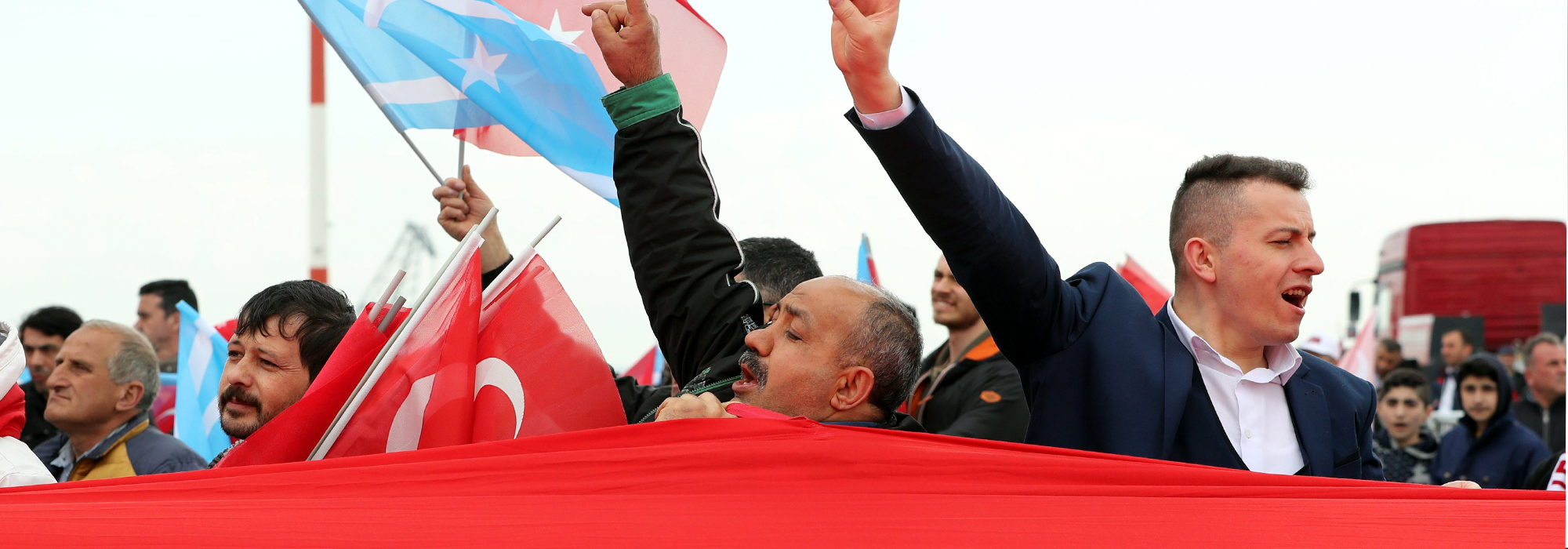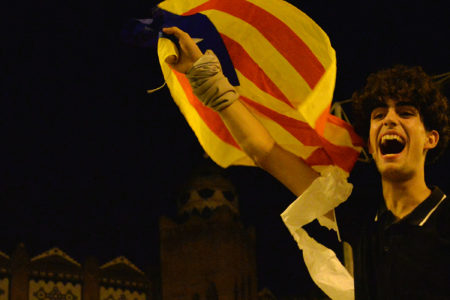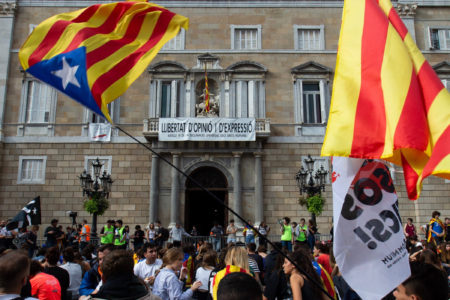
Turkey is on the last leg of a referendum campaign. The No Party gave its registration papers to the government on February 6, two weeks after Parliament decided to put a constitutional reform package to a vote. If Turks vote in favour of the referendum question, the government will change over 60 provisions of the constitution to create a presidential system out of the current parliamentary one. The referendum is happening while the country remains under emergency rule, and the changes could see President Recep Tayyip Erdoğan hold on to power indefinitely.
Normally, the ministry in charge of registration issues a receipt as a record of a party’s legal status. But nearly two months later, the No Party is still waiting to exist — and the referendum is on April 16.
Unofficial status means the No Party (the Hayır Partisi in Turkish) can’t rally or print flyers. It can’t drape posters from buildings or plaster slogans on buses outfitted with loudspeakers, like the governing Justice and Development Party (AKP) and the opposition Republican People’s Party (CHP), which run two of the nine authorized campaigns.
But there’s an unintended benefit to outsider status. It fits the philosophy of Melih Bulut, one of the founders of the No Party. The party was created to oppose the reforms and set to disband the day after Turkish citizens cast their vote. Bulut wants to see a new way of doing politics in Turkey that is civil and informed. His party is using the referendum period to begin.
A retired pediatric surgeon, Bulut, 64, is the oldest member of the No Party. He is a former manager and chief physician of several of Turkey’s international hospitals, and is one of the party philosophers. His vision for the country mixes economic theory and geopolitics. He quotes American writer Thomas Friedman to explain Turkish populism; Turks are just as mystified as anyone else in an age of acceleration, he argues. And like many Turks, Bulut views his country of 80 million as a significant power, more so than its population alone might suggest, with its East-West geography, economy and customs.
Bulut helped write the No Party rulebook, which forbids hateful language and allows only political, and not personal, attacks.
The Yes campaign takes a contrasting approach. It is led by Erdoğan and Prime Minister Binali Yıldırım, who took the post when his predecessor resigned, partly over planned changes to the constitution. Government officials have likened the No campaigners to terrorists and to the rebels behind a failed coup last July. Speaking in Istanbul in February, Erdoğan compared them to the militant Kurdistan Workers Party (PKK) based in Iraq’s Qandil mountains.
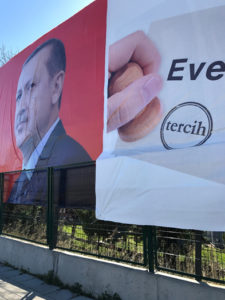
“Who says no? The PKK says no. Who says no? Qandil says no. Who says no? Those who want to divide this country say no. Those who are against our flag say no,” Erdoğan said.
And yet, Bulut argues, “this period will be the healing period of Turkish politics.”
That’s a twist on the popular view of Turkish democracy in regression. Turkey spent a tumultuous winter under emergency rule, in effect since the attempted coup. The government extended the emergency twice, once following a terrorist attack that killed 39 in an Istanbul club on New Year’s Eve. Turks witnessed a fistfight in Parliament over the referendum, then a public rift with the Dutch government in March after the Netherlands blocked a Yes rally for Turkish expats planned on its soil.
How does a civil and informed strategy by an unauthorized campaign team unfold? Cheaply, since the party has no paid staff and runs on private donations by members and friends.
For one thing, the No Party hosts lectures on Facebook Live. They dissect the proposed changes as well as economic issues linked to Turkey’s troubled politics. A lecture by party leader Tuna Bekleviç caught nearly 70,000 viewers.
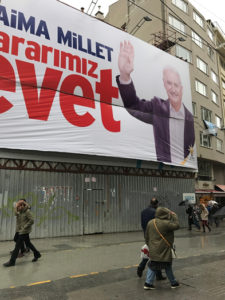
But traditional face time still rules. Bekleviç travels each week to meet Turks across the country, especially in the conservative east, where people are more likely to vote with Erdoğan. Unlike fellow party member Bulut, Bekleviç has political history. He twice ran for Parliament and is a former adviser to the AKP. As a no campaigner, he hosts small meetings, and his tone is conversational and polite.
Bekleviç can relate to conservatives because he is one. The No Party tries to reach people like its own members, who don’t demonize the AKP but think its proposal is a bad idea.
Bulut and Bekleviç operate on the fringe of what’s legal or tolerated during the emergency. Meetings set up with business or other community groups are sometimes observed by police, sometimes cancelled at the last minute. Bulut said a phone call from the AKP is enough to convince people to stay away.
Since the failed coup, the government has dismissed tens of thousands of academics and civil servants. Already the number one jailer of journalists in the world, Turkey put some 100 journalists behind bars under emergency rule, according to figures released in January by Reporters Without Borders.
Bulut chuckled at the possibility of prison, when I spoke to him on a recent visit. He leaned back in his chair in a heated office in Istanbul’s Taksim neighbourhood, a notebook with a cartoon cover from his granddaughters on the table, and said jail would give him time to rest and read. His family is supportive: he has a daughter practicing human rights law in Geneva and a son heading to China to work as an engineer, if the required visa for Turkish citizens is approved.
The kind of company that attracts his son to China is the kind that’s packing up and leaving Turkey. Corporate flight will escalate if Erdoğan wins on April 16, Bulut said.
Polls predict a close vote. The referendum question asks voters to say yes or no overall to a package of changes that will bash out a presidential system from Turkey’s parliamentary one. It’s risky to create a new governance system from one designed for a different purpose. That’s the main concern of a Council of Europe advisory unit called the Venice Commission that issued its analysis in early March.
Melding together previously separated powers, without enough of the checks and balances through branches like the judiciary that characterize other democratic presidential systems, will mean “excessive concentration” of power in the presidency, the commission said. For example, the rule prohibiting the president’s membership in a party will be removed, meaning Erdoğan will no longer be separated from the ruling party. He will be able to appoint and unseat ministers and fill other top posts without threat of veto by Parliament. At the same time, the president will have greater control over the constitutional court. The changes will also add a third five-year term to the current limit of two, giving Erdoğan these greater powers for possibly another ten years as president.
The amendments are both expansive and vague, leading the commission to warn that a Turkish president could hold unlimited power for an unlimited term. This means countries that deal with Turkey, on military issues or on the migration of refugees, will be dealing with Erdoğan for a long time. For Canada, it means a major NATO partner is heading toward authoritarianism. It could mean a bump in immigration too, as dual citizens and those with family members already abroad contemplate a future with weaker rights or simply with greater instability.
The Venice Commission also criticized Turkey for holding the referendum during a time of clipped freedoms under the emergency, with officially limited campaigning and an unofficially intimidated media and public. Other countries disallow major political changes such as constitutional amendments during emergency rule; many, including Canada, Italy and Germany, forbid elections under these conditions. Turkey has no such rules. With forced closures of independent media, bans on public assembly and other cuts to civil rights under the nine months of emergency law, the commission found it “highly doubtful” that Turkey’s referendum will be free or fair.
Bulut called the AKP “a threat to Turkey” because of initiatives like this one, which seeks to overhaul the political system outside the normal rule of law, while groups like the No Party are shut out. The AKP has governed for 15 years and Bulut thinks it has lost vision.
“There’s a tremendous need for new political organizations,” Bulut said. “When I ask young people why they are not interested in politics, they say the parties are not saying anything to us.”
If the “Turkish style” presidency envisioned by the AKP emerges after April, renewal of parties or people is unlikely. The Venice Commission said Turkey risks degenerating into authoritarian, personal rule.
The choice is now before Turks, and Bulut has hope for the country.
“I am always optimistic because I’m a surgeon. The patient will get well.”
Photo: Supporters of Nationalist Movement Party (MHP) during a « Vote Yes » rally in Istanbul, Turkey, 09 April 2017. EPA/CEM TURKEL
Do you have something to say about the article you just read? Be part of the Policy Options discussion, and send in your own submission. Here is a link on how to do it. | Souhaitez-vous réagir à cet article ? Joignez-vous aux débats d’Options politiques et soumettez-nous votre texte en suivant ces directives.



